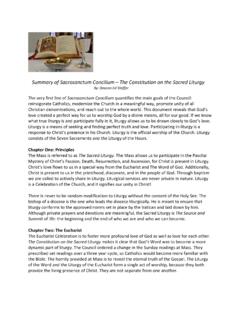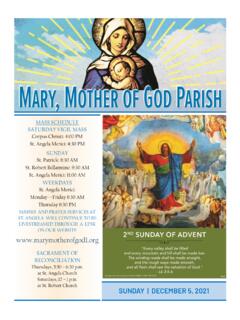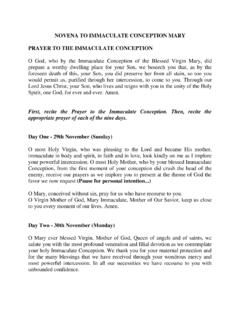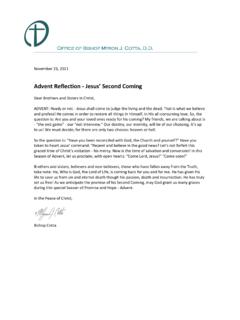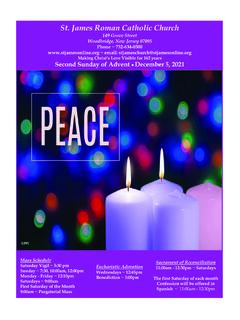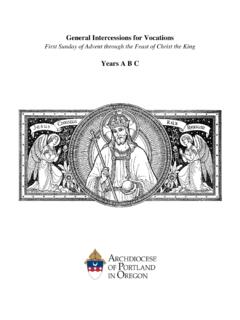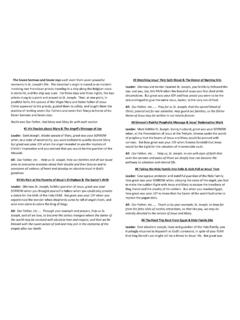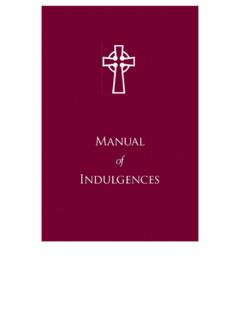Transcription of First Reconciliation & First Communion Preparation Handbook
1 0 First Reconciliation & First Communion Preparation Handbook 1 I. General Information for Parents First holy Communion and Reconciliation are continued part of your child s journey of faith. As you look back on your child s baptism and forwards to their confirmation and active participation in the life of the church, it is our hope to accompany you. We desire to prepare your child to understand and appreciate the depth of love Christ shows them (and us) in the healing sacrament of Reconciliation and in the gift of His very self in the most holy Eucharist. We encourage you, as the parents, and primary educators of the faith, to be involved Sunday Mass, Parish life, in each of the activities and family assignments, and to foster family conversations at home, based on faith. We hope also that you will reflect on your journey as parents, and renew your commitment to continue grow your faith, love your children well and guide them as they grow in their own faith.
2 This renewed commitment involves developing a genuine desire to participate in the Eucharist and the sacramental life of the Church. Parent Responsibilities: For our children to grow in their faith, it is vital that we as parents - Understand our own faith Are growing in our relationship with God Are living out the faith and setting a living example for our children. Understand and explain the importance of the sacraments to our children and share our own experiences so that our children understand the sacraments on a personal level. Support our children to attend class, holy Mass and scheduled sacramental Preparation . The Church will provide support for your journey with your child in the form of two family retreats. It is our hope that the retreats 2 will remind you of the truths about each sacrament, re-kindle your own relationship with Christ and give you teaching points for talking with your child about their journey of faith.
3 II. Sacrament of Reconciliation : (From the Catechism of the Catholic Church #1486-1498) To the eyes of faith, there is no evil worse than sin, which wounds God s honor and love. The forgiveness of sins is conferred by the Sacrament of conversion, confession, penance, or Reconciliation . The penitent (the one confessing) performs three actions: repents of sins with contrition (feels sorrow for having done wrong and resolves not to commit those sins again) confesses sins to the priest Intends to make reparation. The priest performs three actions: offers counsel proposes a penance (actions or prayers to demonstrate the penitent s repentance) Gives absolution (forgives the sins in the name of the holy Trinity). All grave (mortal) sins must be confessed. Lesser (venial) sins do not need to be confessed, but it is recommended to do so anyway.
4 Sacramental confession has the following effects: Restores the penitent to God Reconciles the penitent to the Church Remits the eternal punishment incurred by mortal sins At least partially remits the temporal punishment resulting from sin (also occurs through purgatory) Provides peace of mind and a clear conscience Increases spiritual strength for Christian living 3 Priests take very seriously the seal of the confessional. Canon law strictly prohibits any priest from discussing anything uttered during sacramental confession, and many priests throughout the world have chosen to be imprisoned or killed rather than violate this sacred seal. III. Child s Preparation for Reconciliation A. Classroom Preparation Students discuss Reconciliation in their classroom sessions, which typically involve practice confession. The parish priest(s) will often visit the classrooms as well to discuss Reconciliation and to assure students that priests cannot discuss what anyone confesses.
5 B. Preparation at Home Take some time to talk with your child about Reconciliation . It is very common for children to be nervous or scared before First Reconciliation , but they typically feel extremely peaceful and relieved afterward. For practice, you have been provided information below and a packet in your folder to practice the examination of conscience, the procedure and the prayers. Share your own experiences of Reconciliation : How did you feel the First time you went? How do you feel when you go now? If possible, go to Reconciliation as a family. While your child does not need to participate before the retreat, observing their parents or older siblings partaking in the sacrament can be very powerful. You and your family will be invited to take advantage of the Reconciliation time offered during the retreat as well. C. Familiarity with the Rite of Penance Students should be familiar with the Rite of Penance in order to feel more comfortable during their First confession: 4 Rite of Penance: Penitent: Bless me, Father, for I have sinned.
6 This is my First Reconciliation . (In future confessions, say, It has been [approximate length of time] since my last confession.) The penitent now says the sins that s/he can remember, especially all mortal sins. The priest will counsel you and perhaps give you advice for how to avoid these sins in the future. He will give you a penance, which will be either an action or some prayers. Ordinarily, he will then ask you to pray the Act of Contrition. Penitent: (Act of Contrition) O my God, I am sorry for my sins with all heart. In choosing to do wrong and failing to do good, I have sinned against you, whom I should love above all things. I firmly intend, with the help of your grace, to sin no more and to avoid whatever leads to sin. Amen. The priest then pronounces the Words of Absolution, and the penitent makes the Sign of the Cross.
7 Thank the priest, and go do your penance. IV. Celebration of First Reconciliation March 16, 2020 (Monday) First Reconciliation Day 7:00 Prayer Service and Examination of Conscience followed by receiving the Sacrament of Reconciliation . Procedure: Catechists will direct the children to one of the priests for their Reconciliation . After all the children have finished, parents will be encouraged to participate in Reconciliation . There will be no formal dismissal, you may leave quietly and prayerfully as your family is done. 5 Note: Please refrain from taking any videos/ pictures during First Reconciliation . V. About the Eucharist From the Catechism of the Catholic Church #1407-1419 The Eucharist is the source and summit of the Christian life; it is Jesus himself. In this sacrament, we become what we receive: the Body of Christ.
8 At Mass, Jesus acts through the ministry to priest to offer the sacrifice of our salvation. Transubstantiation is a theological term that describes the complete change of the substance (what something is in its deepest being) of bread into the substance of Jesus Christ. While the substance changes, the accidents (external features) remain the same what looks like bread, tastes like bread, and crumbles like bread is actually Jesus. Because of this change in substance, it is proper to offer the Eucharist worship. The effects of receiving the Eucharist are: An increased and deepened union with Jesus Forgiveness of venial (lesser) sins A strengthening to avoid future mortal (serious) sins A reinforced union with all other believers, who are the Church A Preparation of the body for bodily resurrection The Church encourages the faithful to receive the Eucharist every time they attend Mass.
9 Anyone aware of having committed mortal sin must go to sacramental confession before receiving Jesus in the Eucharist. Out of respect and reverence for Jesus in the Eucharist, there are several small ways to prepare for Mass. The Church sets a one-hour fast (this includes gum and coffee) before receiving the Eucharist as a way to remind ourselves that we are about to receive the Son of God. 6 Another way to keep in mind the importance of the Eucharist is to wear respectful clothing to church. As we prepare our bodies to receive Jesus, we can also prepare our hearts. We can read the readings for Mass that day and think of Jesus and pray. There are some suggested prayers for before and after Communion in your folder. V. Child s Preparation for First Communion A. Formal Preparation Students in our PSR programs start in 1st grade learning about Jesus in the Eucharist.
10 All students will discuss the significance of the Eucharist in their classroom sessions. Much effort is taken so that students understand it is Jesus they receive and how to prepare their hearts and minds to receive him. They will also practice how to receive the Eucharist in their hands or on their tongue as well. Additional parts of our parish Preparation for First Communion : Growing In Faith Together (GIFT) Workshop October 27, 2019 (Sunday) @ 10:00 November 24, 2019 (Sunday @ 10:00 January 26, 2020 (Sunday) @ 10:00 February 16, 2020 (Sunday) @ 10:00 March 15, 2020 (Sunday) @ 10:00 April 19, 2020 (Sunday) @ 10:00 First Communion Rehearsals: April 25, 2020 (Saturday) @ 10:00 May 1, 2020 (Friday) @ 6:00 First Communion Day: May 2, 2020 @ 10:00 7 Arrival: Please have your child to the Fr. Martin Hall not later than 9:30 for the 10:00 First Communion Mass.)
